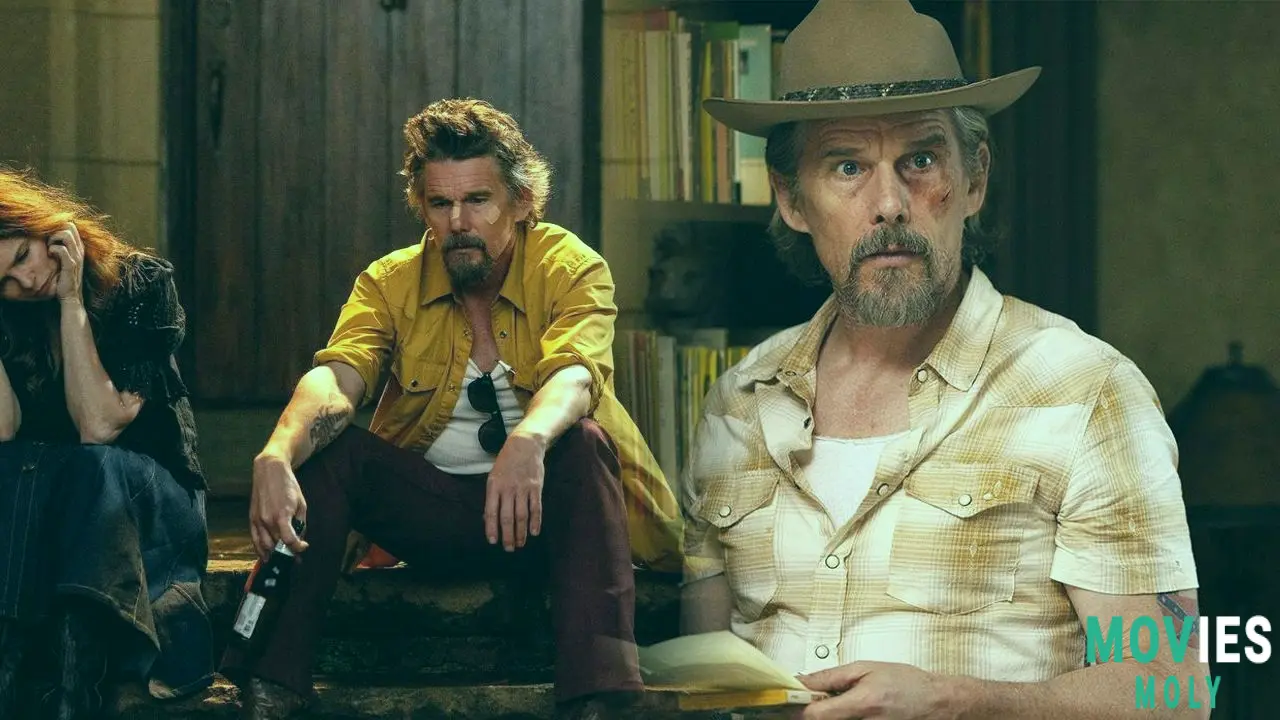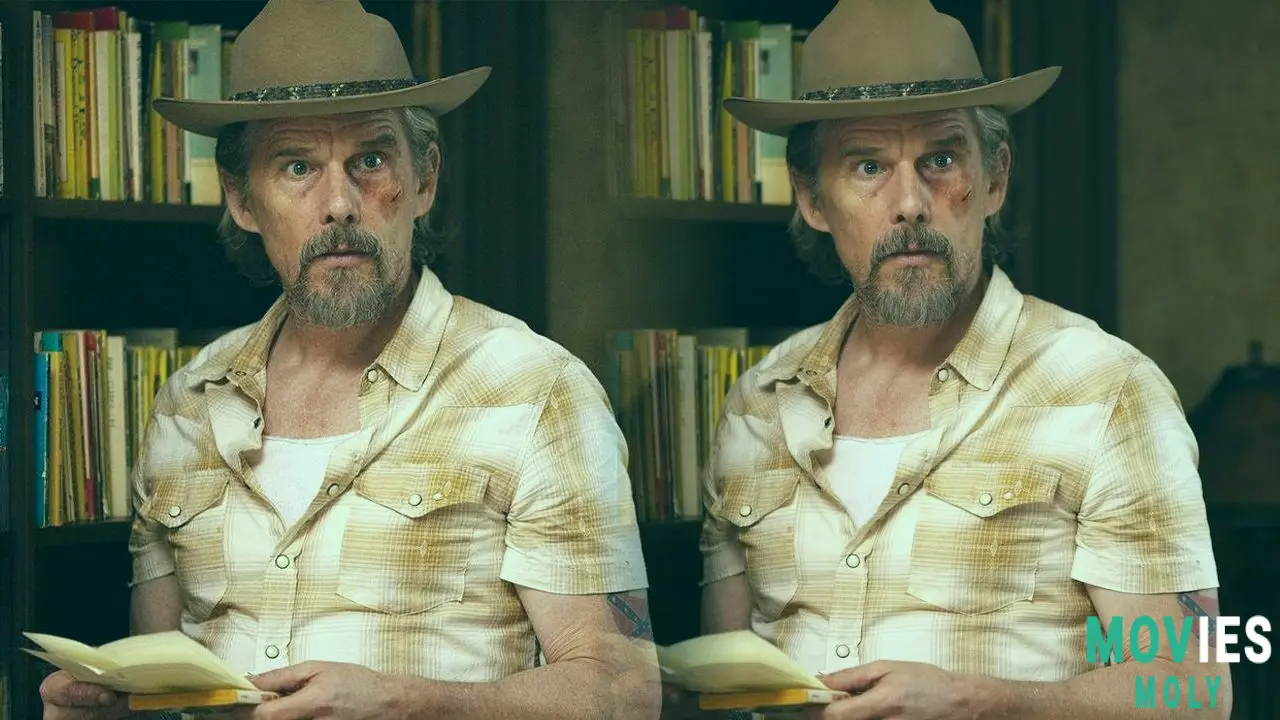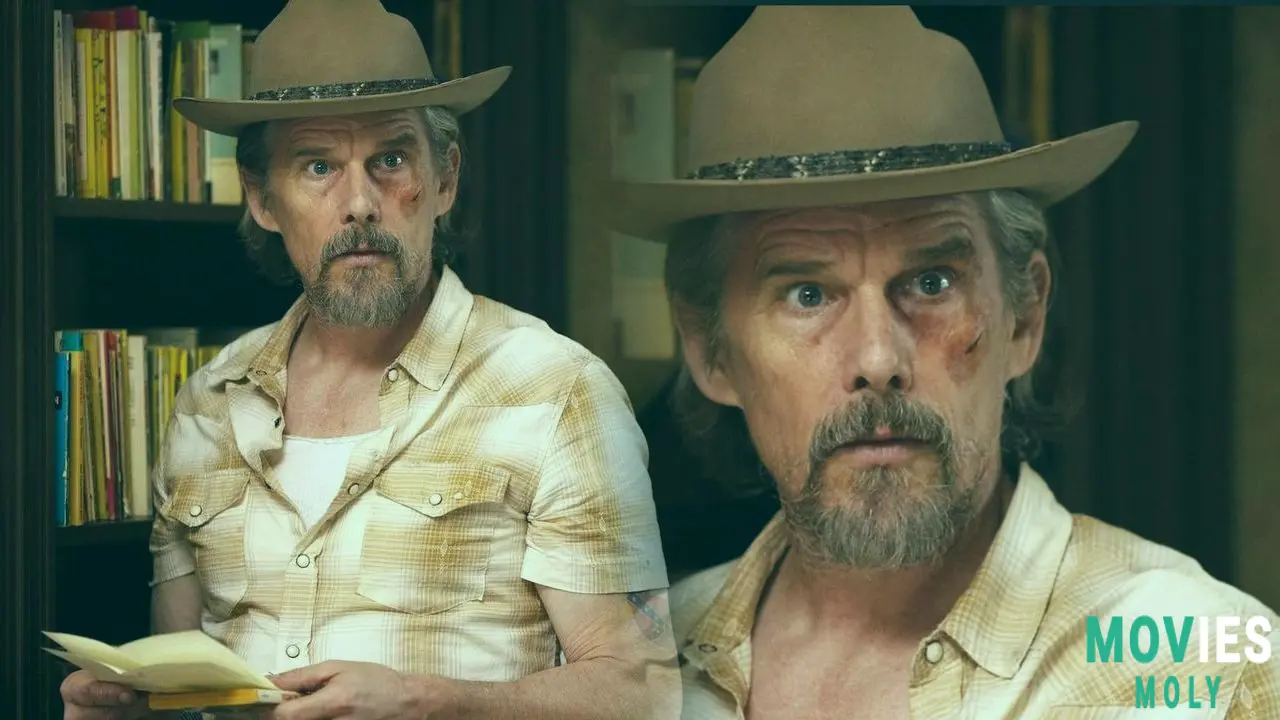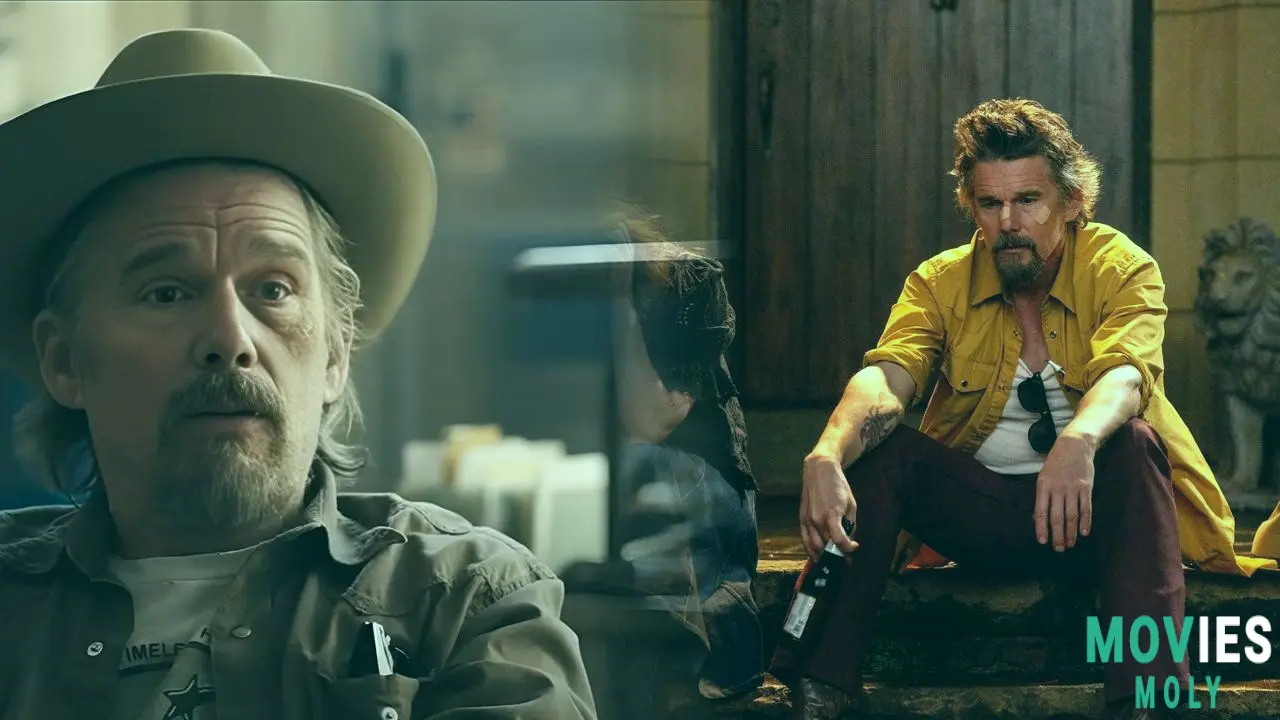Get ready for a deep dive into FX's latest must-watch series, The Lowdown! Starring Ethan Hawke, this gritty noir isn't just another crime thriller; it's a fascinating blend of fiction and real-life history, all thanks to its main character's incredible inspiration.
TL;DR- Ethan Hawke plays Lee Raybon, a "truthstorian" investigating Tulsa's hidden past and current conspiracies in FX's new show, The Lowdown.
- Raybon's character is heavily inspired by Lee Roy Chapman, a real-life Tulsa journalist and historian who famously exposed the city's uncomfortable truths, including its ties to the 1921 Race Massacre.
- The series, created by Sterlin Harjo (of Reservation Dogs fame), uses Tulsa's rich and often buried history as a co-lead, blending dark noir themes with comedic elements and a personal touch.
If you're anything like us, you've probably been buzzing about The Lowdown since its recent premiere. This new FX series, which you can also stream on Hulu, has quickly captivated audiences with its unique blend of neo-noir mystery, dark humor, and a very distinct sense of place. At the heart of it all is Ethan Hawke, delivering a performance that’s both compelling and complex as Lee Raybon, the self-proclaimed "truthstorian" determined to unearth Tulsa's deepest, darkest secrets.
But here’s the kicker: while Raybon’s adventures are fictionalized for dramatic effect, the spirit, passion, and mission behind his character are rooted in a real-life figure whose dedication truly reshaped how Tulsa confronts its past. Intrigued? Let’s pull back the curtain on the man who inspired it all and how his legacy breathes life into this captivating new show.
Unpacking Lee Raybon: The "Truthstorian" with a Powerful Real-Life Muse

Ethan Hawke’s Lee Raybon is no ordinary detective. He’s a rare-bookstore owner by day, but by night (and often during the day, much to his own peril), he’s a citizen journalist obsessed with digging into the shadowy history and corruption of Tulsa, Oklahoma. He calls himself a "truthstorian," a title that perfectly encapsulates his relentless pursuit of uncomfortable truths. This intriguing persona, however, isn’t just a clever writer’s invention; it’s a direct homage to a remarkable individual: Lee Roy Chapman.
Lee Roy Chapman (1969-2015) was a true Tulsa icon – an artist, author, and public historian fiercely committed to uncovering Oklahoma's often-painful past. Sterlin Harjo, the brilliant mind behind The Lowdown (and the beloved Reservation Dogs), actually collaborated with Chapman in the early 2010s on a video series called "Tulsa Public Secrets" for This Land Press. Harjo would ride shotgun with a camera as Chapman drove him around Tulsa, pointing out forgotten landmarks and sharing stories that many preferred to keep buried. Chapman embraced the label of "citizen journalist," but his influence stretched far beyond that; he was a local historian, a muckraker, and a provocateur all rolled into one.
"He was a really big inspiration on my work and who I am and how to think of where you live, and to look at your community right around you, and try to make a difference there."
— Sterlin Harjo, on Lee Roy ChapmanChapman’s most impactful work came in 2011 with his investigative series, "The Nightmare of Dreamland: Tate Brady and the Battle for Greenwood." This groundbreaking exposé revealed the ties between W. Tate Brady, a celebrated founder of Tulsa, and the Ku Klux Klan, as well as his involvement in the horrific 1921 Tulsa Race Massacre. For those unfamiliar, this tragic event saw the murder of approximately 300 Black residents and the destruction of the thriving Greenwood neighborhood, often referred to as "Black Wall Street." Chapman’s fearless journalism compelled Tulsa to finally face these unpleasant realities, ultimately leading to Brady Street and the Brady Arts District being renamed. This willingness to shake the very foundations of a city's mythology is precisely what Harjo captures in Lee Raybon.
While The Lowdown amps up the drama with fictional conspiracies, crime, and noir-inspired trysts, the core commitment to uncovering overlooked stories, challenging narratives, and advocating for truth is Chapman's authentic legacy. He founded the Center for Public Secrets in 2008, a Tulsa repository dedicated to preserving "overlooked, neglected, and misunderstood" Oklahoma history. Chapman's fierce dedication to facts, even through personal adversity, makes Raybon's character a poignant tribute to his enduring spirit.
Ethan Hawke's Deep Dive into a Flawed Yet Noble Character

When it came time to cast Lee Raybon, Sterlin Harjo knew exactly who he wanted: his friend, Ethan Hawke. Hawke’s career is rich with roles that balance deep moral complexity with raw humanity, from films like First Reformed to series like The Good Lord Bird. He excels at embodying characters weighed down by conviction, haunted by questions, and stubbornly unwilling to look away from uncomfortable truths. This makes him a perfect fit for Raybon, a character who is, in Hawke's own words, "fighting for the truth. But at what cost?"
Raybon isn't your typical shiny hero. He’s often battered and bruised, physically and emotionally. As Hawke humorously noted, "Everyone will enjoy me getting my ass kicked," acknowledging that getting beat up is practically a job requirement for a noir hero. But beyond the physical scrapes, Raybon grapples with profound moral ambiguities. He's a "warrior poet who claims to hate poetry" and, despite constantly talking about the value of truth, he's shown lying to his own teenage daughter, Deidra (Siena East).
This internal conflict is central to one of the show’s most resonant lines, delivered twice in the pilot: "There's nothing worse than a white man who cares." Keith David, who plays private investigator Marty, and Michael Render (aka Killer Mike), playing publisher Cyrus Arnold, both utter this cautionary wisdom to Lee. Hawke himself conceded that knowing what he knows about such men, characters like Marty and Cyrus would indeed think that way. Keith David, a Black man in America, revealed that the line resonated deeply with him, reflecting a reality he lives. This critical perspective ensures Raybon’s noble mission isn’t presented without a challenging, self-aware lens, highlighting the often-unforeseen consequences and blowback that can affect communities least deserving of it.
Harjo himself described Raybon as a "tragicomic figure perpetually floundering his way through his investigations and his life." He also wove some of his own experiences into Raybon’s character, particularly the struggle of raising a child while trying to establish himself as a filmmaker. This blend of personal and historical inspiration makes Raybon a layered, authentic figure: part real journalist, part storyteller, and part father grasping for meaning.
Tulsa Takes Center Stage: A City Teeming with Secrets

Much like Harjo’s critically acclaimed Reservation Dogs, The Lowdown doesn't just use Oklahoma as a backdrop; it makes the city of Tulsa an active, living participant in the story. Harjo has explicitly stated that Lee Roy Chapman opened his eyes to relating to Tulsa in a completely different way, seeing the "invisible corners and names of the unknown, the stories that will not remain hidden." This approach permeates every aspect of The Lowdown, transforming Tulsa into a kind of co-lead character alongside Hawke.
Noir, by definition, is deeply dependent on its setting, and Harjo argues there’s "no better setting for secrets, betrayal, and the revelatory than Tulsa." He challenges the traditional association of noir thrillers with big cities, pointing out that corruption and hidden dynamics exist everywhere, especially in "flyover states" that are increasingly dictating the future. Tulsa is a nexus for conversations about history erasure and racial tension, built on layers of narratives: its founding by the Muscogee Creek people, the oil boom, and the enduring trauma of the 1921 Race Massacre.
By rooting the show in this specific, complex geography, Harjo not only flips the narrative but also centers voices and histories that have long been ignored. His goal, he shared, isn't to make anyone flinch, but to tell the truth about darkness, light, and what lies beneath, all "from a place of love."
The Talented Crew Behind the Noir Magic in Tulsa
Sterlin Harjo isn’t alone in bringing this vision to life. The series boasts an impressive array of talent both in front of and behind the camera. Director Danis Goulet, a Cree and Métis filmmaker from Saskatchewan, joined the team after working with Harjo on seasons 2 and 3 of Reservation Dogs. She was drawn to The Lowdown for its noir influences and Harjo's ability to find a "beautiful interplay between light and dark," blending serious, relevant issues with "ridiculous absurd comedy."
Goulet and Harjo spent hours "nerding out on camera lenses" to achieve a gritty, lived-in aesthetic, drawing inspiration from '70s horror movies and classic noir films like Robert Altman’s The Long Goodbye, John Cassavetes' works, and even the Coen Brothers' The Big Lebowski. Goulet described the production as "scaling this mountain" due to its multiple shoot locations, packed schedule, and A-list cast, which also includes the likes of Kyle MacLachlan as the gubernatorial candidate Donald Washberg, Jeanne Tripplehorn as the mysterious Betty Jo (Dale Washberg's widow), Keith David, Michael Render, and even Peter Dinklage in an unspecified role. The late, great Graham Greene also made an appearance, with Goulet recalling being moved to tears by his first take, calling him a "master at his craft" and a "grandfather figure on set."
As an Indigenous filmmaker, Goulet embraces the political nature of her work, noting that any opportunity "to have a go at existing power struggles in the way that they subjugate people" is one she'll take. She hopes audiences are not only entertained but also reflect on the power structures and forces of white supremacy interrogated by the show, urging everyone to be "truthstorians" in their own right.
Why "The Lowdown" is a Must-Watch Series for Everyone
In a cultural moment where questions of truth, history, and accountability are more critical than ever, The Lowdown lands with urgent and poignant relevance. By grounding its fictional noir protagonist, Lee Raybon, in the enduring legacy of a real journalist like Lee Roy Chapman, the show expertly weaves fiction and reality together. Ethan Hawke's portrayal of Raybon is a testament to Chapman's unwavering pursuit of truth, serving as a powerful reminder that sometimes the most radical act is simply refusing to let history stay buried.
Whether you're a fan of gritty crime thrillers, thought-provoking dramas, or simply appreciate a series that genuinely adds something new to the TV landscape, The Lowdown promises a compelling watch. It’s a show that champions truth, justice, and the idea that even the most flawed heroes can make a profound difference by shining a light on what’s hidden. So, grab your popcorn and get ready to discover the lowdown on Tulsa’s secrets.
FAQ: Your Top Questions About "The Lowdown" Answered Where can I watch The Lowdown? The Lowdown airs on FX and is available to stream on Hulu (or Disney+ in some regions like Canada) the next day. When do new episodes of The Lowdown air? New episodes of The Lowdown air Tuesdays at 9/8c on FX. Is Lee Raybon based on a real person? Yes, Ethan Hawke's character Lee Raybon is heavily inspired by the real-life Tulsa journalist, historian, and activist Lee Roy Chapman. While Raybon's specific experiences in the show are fictionalized, his mission and spirit come directly from Chapman's work. What is The Lowdown rated? The series is rated TV-MA for mature audiences. Sources- Collider.com
- Salon.com
- CBC.ca/arts
- FXNetworks.com
- SoapCentral.com
- ExtraTV.com






